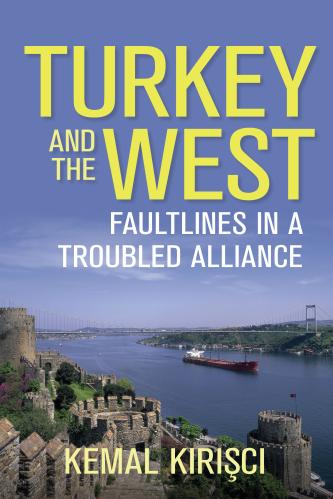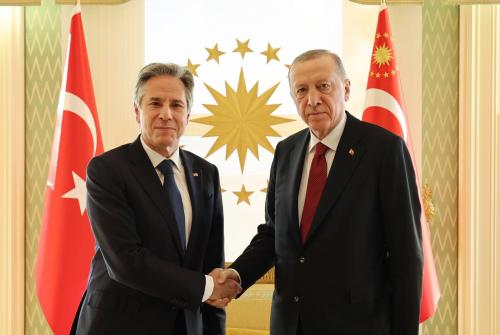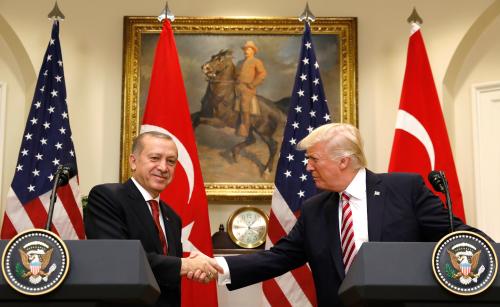It is positive that Washington is going to Ankara this week. Engagement by America’s three most senior national security officials with their Turkish counterparts in the same week sends a strong signal about the seriousness with which the United States takes this relationship. At the same time, U.S. officials must express their concerns about Turkish actions that are contributing to fractious ties. This piece originally appeared on Foreign Policy.
American diplomats are out in force in Turkey this week. On Sunday, National Security Advisor H.R. McMaster met in Istanbul with Ibrahim Kalin, his nominal counterpart. On Wednesday, Secretary of Defense James Mattis met with Defense Minister Nurettin Canikli in Brussels on the margins of the NATO ministerial summit. Later this week, Secretary of State Rex Tillerson is set to visit Ankara for talks with Turkish President Recep Tayyip Erdogan and Foreign Minister Mevlut Cavusoglu.
Turkish leaders’ expectations for these meetings were running high, if their rhetoric is to be believed. Cavusoglu said the strained bilateral relationship would “either be fixed or completely broken.” Prime Minister Binali Yildirim echoed him, saying: “Our NATO ally and longstanding strategic partner should pull itself together and make a sound decision.” As these remarks came after McMaster’s visit, it seems safe to assume he did not provide the desired answers. Nor will Tillerson.
The top agenda item remains divergent views on Syria, particularly Turkish unhappiness about U.S. cooperation with a faction of Syrian Kurds, the People’s Protection Units (YPG), in the fight against the Islamic State. Turkey has long objected to this partnership, given the YPG’s links to the Kurdistan Workers’ Party, or PKK, a U.S.-designated terror organization that has fought an insurgency against the Turkish state for decades. Ankara’s primary goal in Syria has become preventing the YPG from creating an autonomous Kurdish region along the Turkish border, which Erdogan fears could lead to an independence bid or be used to stage attacks on Turkey.
U.S.-Turkey tensions spiked in January, when American military officials announced plans to train a 30,000-strong “border security force” with a significant YPG component to be deployed along the Turkish border. When Ankara erupted with predictable outrage, Tillerson said that “some people misspoke” and clarified that the United States intended only “to ensure that local elements are providing security to liberated areas.” However, days later he gave a speech on the Trump administration’s Syria policy that described an enduring U.S. military presence to prevent the re-emergence of the Islamic State, counter Iran, and “help pave the way for legitimate local civil authorities to exercise responsible governance of their liberated areas.”
Ankara, which interpreted these plans as American security guarantees for a YPG-controlled region, launched Operation Olive Branch with Russian acquiescence against Russian-backed YPG forces in the Afrin region of northwestern Syria. Turkey has threatened to expand this operation some 60 miles east, to Manbij. This risks confrontation with U.S.-backed YPG fighters, as well as the worrying prospect of two NATO allies pointing weapons at each other, given the presence of U.S. special forces. A prolonged operation could also distract from the final push against the Islamic State—Mattis has acknowledged that some YPG fighters have already moved to Afrin.
As a result of the U.S. government’s focus on defeating the Islamic State and the military’s struggle to find viable ground forces to enable this effort, the diplomatic approach to Turkey has been akin to a frog in a boiling pot of water: The United States has slowly increased cooperation with the YPG while seeking to assuage Turkish security concerns. This approach was always more plausible for Washington than for Ankara, with the military operation in Afrin dramatically expressing Turkish frustrations and highlighting contradictions in U.S. policy.
In this week’s meetings, Turkish leaders will have reminded their counterparts of two American promises. First, Turkey opposed the provision of weapons and training to the YPG, given fears they would benefit the PKK in Turkey. After grudgingly tolerating U.S. cooperation with the YPG in the fight against the Islamic State, Ankara wants those weapons withdrawn per American assurances that major battles are complete. Second, Turkey wants YPG forces to withdraw from Manbij. In spring 2016, Ankara acquiesced to U.S. arguments that the YPG should cross the Euphrates River (a marker between the cantons the group is seeking to connect) to clear the Islamic State from Manbij, with the understanding it would withdraw after the fight and allow the Turkish-backed Free Syrian Army to provide local security. When the YPG failed to leave and instead pushed west, Turkey launched Operation Euphrates Shield in August 2016 to thwart that movement. The YPG’s continued presence in Manbij is prompting Turkish calls for military action now.
McMaster, Mattis, and Tillerson will undoubtedly acknowledge Turkey’s security concerns and seek to provide reassurances, though Turkish patience is wearing thin in the absence of a clear strategy. U.S. officials will rightly underscore the need for Turkey to limit its operation, avoid civilian casualties, refrain from moving toward U.S. and YPG forces in Manbij, and conclude quickly to keep the focus on the Islamic State. (Given the slow pace of Turkey’s fight in challenging terrain, the near-term risk of clashes with American soldiers has lessened—yet the need for a solution is no less urgent.)
This week’s meeting are unlikely to meet Turkish expectations for solutions to this policy conundrum, in part because there are ongoing fights within the Trump administration about the Turkey-Kurd conflict at the heart of the Syria puzzle. This internal debate has spilled over into confusing and contradictory public messages: President Donald Trump told Erdogan the United States would stop arming the YPG and State Department officials described the relationship as “temporary, transactional and tactical,” yet the Defense Department—especially Central Command and Special Operations Command—has made clear it has no intention of abandoning its Kurdish partners. The Defense Department’s budget request on February 12 highlighted the military’s expectation of continued cooperation. The document included $550 million for partner security forces in Syria—$300 million for train-and-equip activities and $250 million for “border security requirements related to the counter-ISIS mission.”
Although the emphasis on defeating the Islamic State is necessary, it should not be the sole objective of U.S. policymakers. With U.S. interests in Turkey and the broader region in mind, Washington should develop a more holistic strategy that addresses the crosscutting complexity of these issues. In particular, the United States should help Turkey resolve its Kurdish problem. U.S. officials should urge the Turkish government to resume peace talks with the PKK, which broke down in July 2015 after a 30-month ceasefire, due in part to Syria-related violence. This fight is destructive to Turkey’s domestic politics, costly to the civilian population, and hindering efforts to stabilize the wider region. The pre-election environment, which incentivizes Erdogan to exploit rather than solve the conflict to gain favor with his nationalist base, makes this a difficult but not impossible policy goal. The United States should also push the PKK—via its engagement with the YPG—to return to a ceasefire inside Turkey, which would remove one of the justifications for a continued state of emergency to fight terrorist organizations. Relatedly, the YPG should sever ties with the PKK.
Turkish officials are framing these visits as an American effort to repair relations, but U.S. officials should also raise their concerns. In particular, McMaster, Mattis, and Tillerson should address Turkey’s deteriorating rule of law and questionable foreign policy decisions. For starters, several American citizens (including Pastor Andrew Brunson) and two Turkish employees of U.S. consulates remain imprisoned on spurious terrorism charges. Virulent anti-Western rhetoric is poisoning public perceptions of the relationship in both countries. Heightened tensions in the Aegean are raising concerns in Greece and Cyprus. The planned purchase of S-400 missiles from Russia, which will not be compatible with NATO systems, could make Ankara liable to sanctions given recent legislation preventing arms sales with Russia. The Afrin conflict has further animated anti-Turkey voices in Congress, with some members musing over whether now is the time to pass an Armenian genocide resolution.
In sum, it is positive that Washington is going to Ankara. Engagement by America’s three most senior national security officials with their Turkish counterparts in the same week sends a strong signal about the seriousness with which the United States takes this relationship. The United States will not give Turkey everything it demands, and needs to develop a strategy for Syrian governance and security that provides stability across the entire region, yet sustained dialogue builds trust in the process of finding a way forward. At the same time, U.S. officials must express their concerns about Turkish actions that are contributing to fractious ties. Both sides must work together to repair the relationship before there is nothing left to repair.






Commentary
The United States and Turkey should fix their relationship—Before it’s too late
February 16, 2018